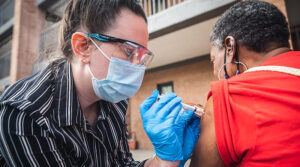New Program Helps Underserved Communities Combat COVID-19
Bolstering its efforts to promote health equity for vulnerable populations, Duquesne has created the Bridges to Health program to address disparities in COVID-19 and disease outcomes.
 Funded by a $475,000 grant from the Henry L. Hillman Foundation, the program supports cross-sector partners who advance strategies to promote health in the community environment, with a focus on COVID-19 mitigation. Teams are working to increase access to COVID testing and flu vaccination, while identifying resident concerns and preferences toward the COVID vaccine to effectively design an inclusive vaccination program in Hazelwood and Clairton.
Funded by a $475,000 grant from the Henry L. Hillman Foundation, the program supports cross-sector partners who advance strategies to promote health in the community environment, with a focus on COVID-19 mitigation. Teams are working to increase access to COVID testing and flu vaccination, while identifying resident concerns and preferences toward the COVID vaccine to effectively design an inclusive vaccination program in Hazelwood and Clairton.
“In both areas, residents suffer from illnesses at a much higher rate compared to other local neighborhoods, and face multiple barriers to accessing preventative health programs and fresh food,” said Dr. Jennifer Elliott, director of Duquesne’s Center for Integrative Health (CIH). “One of the goals of Bridges to Health is to not only meet the community’s most pressing needs at this critical time, but also to create a sustainable solution that provides health care access long-term.”
The new program continues Duquesne’s legacy of promoting health equity in the region’s most underserved areas. In the fall, CIH partnered with the City of Pittsburgh Housing Authority to provide flu immunizations and health screenings to housing authority residents.
“Thanks to the Henry L. Hillman Foundation’s generosity, the university is able to bolster its work to address racial health disparities in two of our region’s most vulnerable communities,” said William Generett Jr., Duquesne’s vice president of community engagement. “This funding is especially important now, as we face an extremely challenging winter with the convergence of the surge in COVID-19 and the flu.”
With assistance from community members, health professionals and Duquesne faculty and students, Bridges to Health will also provide preventative health services, such as flu immunizations and community-based chronic disease management clinics for asthma, diabetes and cardiovascular disease. The Duquesne Asthma Clinic, which has served thousands of children, will expand its efforts, and the Prescription for Change Program will be launched to help improve access to healthy foods and provide support for physical activity.
Duquesne will also hire several Community Health Workers from each neighborhood and support their training and certification.
“This partnership is led and informed by the community,” Elliott said. “By addressing health and social service needs and training a new generation of health care workers, we aim to improve health outcomes in a sustainable manner.”
